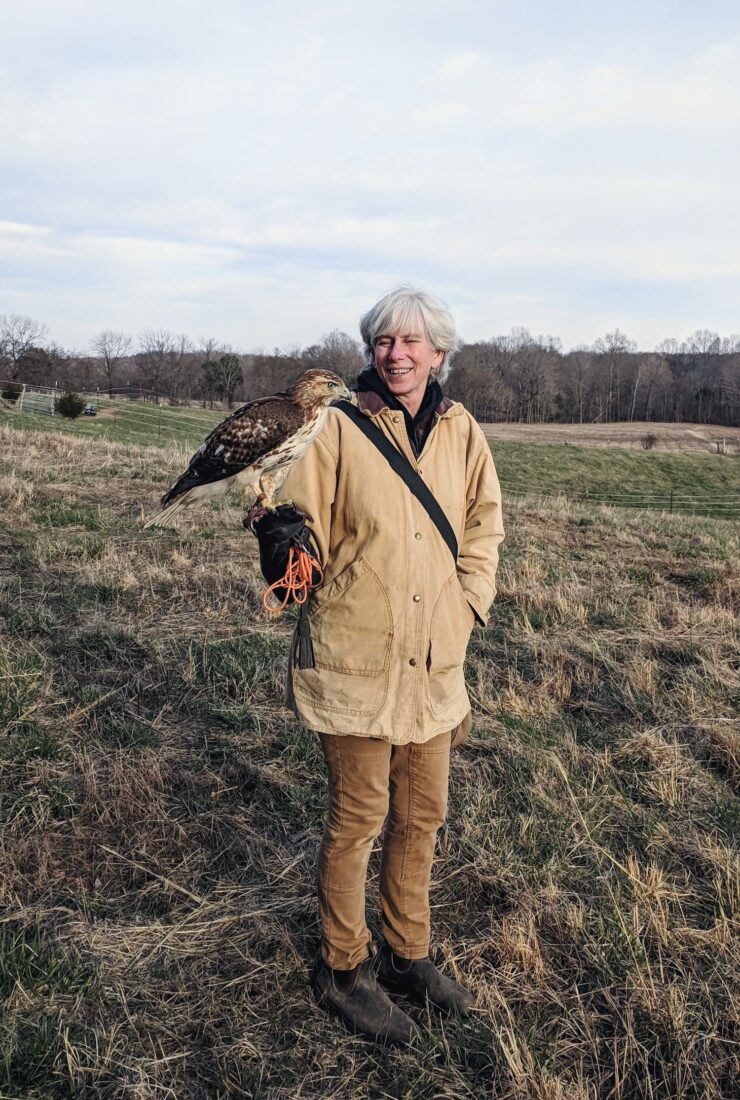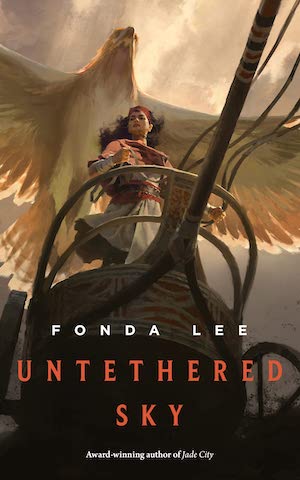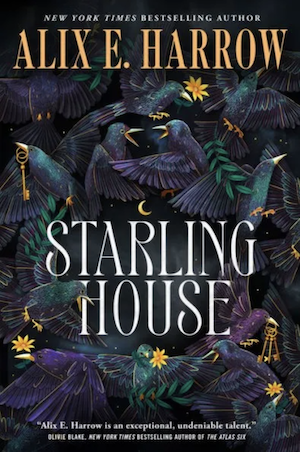Tor.com is pleased to share this conversation between Fonda Lee, author of the Green Bone Saga and the newly released Untethered Sky, and Alix E. Harrow, author of the upcoming Starling House These two writers connected during Lee’s drafting process, and here they chat about everything from falconry to fantasy worldbuilding and more. Check out their unedited conversation below!
Alix Harrow: First: congratulations on the release of Untethered Sky! I’ve been excited about this novella since it was announced, as a fan of big scary birds, nature memoirs, and your work.
Fonda Lee: Thank you, Alix! And let me take the opportunity to say I’m just as excited for Starling House, especially since I got the sneak peek at the awesome cover. I can’t wait to read your take on haunted houses; I know it’s not going to be anything we expect.
AH: I also want to thank you, because there are just not enough opportunities to casually mention that my mom is a falconer who practices horseback archery in her spare time. But then you said you were looking for early readers to fact check your giant bird novella, and I felt my moment had finally come.
FL: It’s amazing what resources we have within our writer community. I was fully prepared to have to do some legwork and cold call falconry experts. I couldn’t believe my good fortune when I started asking around among author friends, and you put me in touch with your mom!
AH: Here she is with the red-tailed hawk she caught, trained, hunted with for a season, and released.

I feel like I should start hiring her out as an epic fantasy consultant, actually (I would take only a modest percentage). She’s a huge fantasy reader with a doctorate in rhetoric and composition, who trains horses and practices Mongolian archery in her spare time.
FL: First of all, Alix, how does it feel to have a mom who’s so cool? You could definitely hire her out as a consultant to the fantasy writing community. So glad I got in before you started charging. How much did your mom inspire or influence you when you were starting out as a writer, and does she beta read all of your manuscripts?
AH: I mean, has any child ever actually, truly, in their hearts, perceived their parents as cool? Even now I have to assemble it all into a list and read it before I’m like, “wait, is my mom…cool?” But obviously, yes she is, and she’s been the first, best, and last reader for everything I’ve ever written. She’s writing her own book, now, actually (Mom if you’re reading this, where’s the next chapter??).
But anyway, she adored your book! She said it felt like fantasy, but the rocs felt like real birds. Why did you go in a more naturalistic direction?
FL: I was so happy when your mom told me that Untethered Sky felt authentic to her as a falconer. That was very much what I was going for; I wanted the rocs and the manticores to seem like real animals, not magical beings. Many fantasy animal companions are benevolent, cute, helpful, or telepathically bonded soulmates to their human partners. How very nice for those fortunate protagonists; I can’t even get my dog to reliably listen to me.
Buy the Book


Untethered Sky
Real birds of prey are fierce, unpredictable wild animals. A gigantic one would be terrifying, and difficult to care for and train, so I wanted to depict that. My modus operandi is always to go for the realistic, grounded story where the speculative element, whether that be magic jade, alien tech, or monsters, feels like an ordinary, believable part of day-to-day life.
The magical elements in many of your stories, on the other hand, often feel much more extraordinary, disrupting normal lives and worldviews when they appear. Will that be the case in Starling House (as I suspect it will)? How do you decide when and how in the narrative to introduce the magical aspects, and to make them convincing when they show up?
AH: You know, it’s actually fascinating that your work feels so realistic and grounded, and yet takes place in secondary worlds, while my stuff feels ~magical~ and yet takes place almost exclusively in the real world.
I think that might be the heart of it, actually–by building another world, you get to skip over the part where your characters see something freaky and go “wAIT mAgIC is ReAL???”
In Starling House I got to play with the Gothic toolbox, which has a slightly different relationship to reality. I think the magic has to creep a bit more, in a Gothic, moving through the traditional stages of: things in this house seem fine but clearly aren’t; did you hear that? did you say this place has rats, Aunt Mildred?; things in this house no longer seem fine; I am insane and the house is on fire.
FL: I think that creepy progression is so effective with haunted house stories because we have this deep psychological need to think of our homes as safe places, and during that slow build you spoke of, there’s usually the ambiguity of, “Is it all in my head?” Which is also terrifying in its own way.
Gothic fiction strikes me as this fascinating aesthetic intersection between romance and horror. What drew you to write a book in the Gothic tradition? Did you have any particular inspirations or touchpoints?
AH: Exactly, yes! A good Gothic is about fearing what you desire and desiring what you fear; it’s “what doesn’t kill us is kind of hot, actually” and it’s “what if we kissed in the ruins of our hopes and dreams.” It’s about the dissolution of the normative social order–which is why marginalized writers have always and will always write the best gothics. Only someone who sees the horror of the social order as it is understands that it’s kind of sexy when it falls apart.
Everything I write is just me talking to all the books I’ve loved before (portal fantasies, fairy tale retellings, etc) and this one is talking to House Books. Which includes the terrifying houses of the literary Gothic (124 was spiteful. Full of baby’s venom. Whatever walked there, walked alone), and the alluring, mysterious houses of the pulpy gothics (Last night I dreamt I went to Manderley again), and the totally separate fantasy tradition of houses that are uncanny, but not malevolent (think of the Beast’s castle, or Baba Yaga’s chicken-legged hut, or Diana Wynne Jones). Basically this book is a Venn diagram of horror, romance, and fantasy.
What genre is Untethered Sky talking to? Where does it fit in your own reading history?
FL: It’s so true that as authors, we’re in a creative conversation with the books that we loved earlier in our lives. Untethered Sky is my mashup of monster-hunting fantasy tropes with the wilderness adventure and animal companion stories I devoured as a kid. (I really, really wanted a pet, if not an animal familiar. It took many years for my parents to oblige me.) As a nerdy introvert, there was something so romantic and appealing about books like Julie of the Wolves and My Side of the Mountain, where the capable young protagonists live off the land with their animal friends. “Wilderness survival” is far from being on my skills list, so to me, those stories seemed to live very much in the same neighborhood as escapist fantasy.
AH: So did you read or re-read any of those animal-kid-companion books for this novella? What other kinds of research did you do?
FL: I didn’t, actually. I went off the vibes from my memory of those books, since I wasn’t trying to write a children’s adventure book; I was writing a fantasy story in which the adult main character, Ester, recounts her earlier years. So the novella actually has the feel of a memoir. Helen Macdonald’s H is for Hawk was a big source of inspiration for me in that regard.
My research into falconry included reading manuals, visiting raptor centers, and going on guided hawk walks. My second expert consultant on Untethered Sky was our mutual friend and fellow SFF author, Essa Hansen, who is also a master falconer. The brilliant thing about having Essa and your mom as beta readers was that they weren’t just excellent sources of technical information about falconry, they also knew the fantasy genre and the writer’s perspective. So they could think through story implications with me, which was so helpful!
I also researched ancient Persia (specifically the Achaemenid Empire) which inspired the kingdom of Dartha in the novella. Rocs and manticores are both monsters from Middle Eastern mythology, so I wanted to place them in their “natural habitat” so to speak. What I was looking for were the sort of details in Ester’s daily life, such as the landscape, the plants and animals, the food, and so on.
What sort of research did you do for Starling House? Does your background as a historian inform what you write and how you approach your work?
AH: I loved H is for Hawk so much!
Buy the Book


Starling House
I wish I could say my history background gave me lots of practical, grounded details about the past which I integrate seamlessly into my fiction, but alas, I did not study material history (useful, clear, would tell me what kind of boots they wore in 1909), but cultural history (vibes over time). I think it mostly gave me a lot of practice in turning a series of sequential events into an actual narrative, a chain of cause and effect that means something.
But Starling House actually isn’t historical–it’s set roughly when and where I grew up, which made the research a lot more personal. It was like: was it really the way I remembered it? What did I make up that wasn’t really there, and what was really there that I couldn’t see?
FL: Are there any periods of time or historical events that haven’t made an appearance in your work yet, that you would want to explore in future books?
AH: If everything I write is a conversation with my formative books…There’s going to be some swords, eventually. It’s inevitable.
FL: Excellent. I do like swords, you know.
AH: But I want to talk more about your monsters. Because there’s the rocs, but then there are also the manticores. Why did you choose these specific, semi-familiar beasts?
FL: As far as fantasy creatures go, rocs and manticores are underutilized compared to, say, dragons and unicorns, so I was partly motivated to give them their literary due. Could I have written the same story with say, giant eagles and giant lions? I suppose so, but like I said earlier, I seem to enjoy “de-magicking” fantasy and making the speculative stuff seem commonplace. I liked the idea of making these exotic beasts from mythology into realistic-seeming animals who eat a lot and shit a lot and would be giant pains in the ass.
AH: And how does Ester fit into that monstrosity? You’ve got this great line: “People have admired rocs for centuries. Artists paint them, sculpt them, tell stories about them. I wanted to be one. I wanted to be the monster that kills other monsters.”
FL: Untethered Sky is a story about obsession and possession and unrequited love. On some level, Ester envies rocs, for their strength and beauty, yes, but also for their monstrosity and thus their freedom from human attachment, pain, and grief. There’s a strong coming-of-age element, too; Ester’s emotional journey is one that involves finding her sense of worth by channeling her personal pain into a demanding and unpredictable profession. (Hey writers, does that sound a bit relatable?)
AH: Okay like, ow???
FL: After writing a big fantasy trilogy with a large cast of characters and multiple POVs, I really enjoyed the different experience of writing a novella focused on just one character. You’ve written a couple of novellas yourself, as well as short fiction. Do you think you’ll write more novellas in the future? Do you have a preference for length, or do you see yourself continuing to move between short stories, novellas, and full-length novels?
AH: One of the things that’s so great about SFF is that there’s a market for any scale of story you want to tell, which means you don’t have to stretch or shrink your ideas. I only get like, one idea per year, but I assume one of them will be novella-sized again.
What can we look forward to from you next, Fonda?
FL: I’m working on a new novel called The Last Contract of Isako, which I’ve been describing as a cyberpunk samurai space opera (without the space), starring a 50-something swordswoman on her last job. My first three books before the Green Bone Saga were science fiction, so it’s been fun returning to play in the sci-fi sandbox. That book will come out in 2025.
Thanks for chatting with me, Alix, and good luck with the upcoming launch of Starling House!
AH: It’s been a total honor, of course. Congratulations again on Untethered Sky!
Fonda Lee is the World Fantasy Award-winning author of the epic fantasy Green Bone Saga, consisting of Jade City, Jade War, and Jade Legacy. She is also the author of the acclaimed young adult science fiction novels Zeroboxer, Exo and Cross Fire. Fonda is a winner of the Locus Award, a four-time winner of the Aurora Award, and a finalist for the Nebula Award and Hugo Award. The Green Bone Saga has been translated into a dozen languages and named to TIME Magazine’s Top 100 Fantasy Books of All Time. A black belt martial artist and former corporate strategist, she resides in the Pacific Northwest.
Alix E. Harrow is the Hugo Award winning author of The Ten Thousand Doors of January, The Once and Future Witches, and various short fiction. Her Fractured Fables series, beginning with the novella A Spindle Splintered, has been praised for its refreshing twist on familiar fairy tales. A former academic and adjunct, Harrow lives in Virginia with her husband and their two semi-feral kids.










